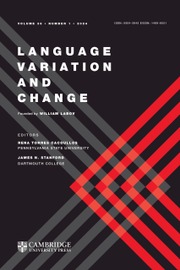Article contents
The emergence of creole subject–verb agreement and the licensing of null subjects
Published online by Cambridge University Press: 07 February 2001
Abstract
A corpus of conversational Bislama (a Melanesian creole spoken in Vanuatu, related to Tok Pisin and Solomon Islands Pijin) suggests that during the 20th century the creole has developed a set of regular inflectional morphemes on the verb that agree in person and number with the subject of the finite clause. It is shown that, where the agreement paradigm is referentially richest, the language is also beginning to grammaticize a tendency towards phonetically null subjects (pro-drop). Three possible analyses of the Bislama verb phrase are evaluated; consistent support for only one is found in the spoken Bislama corpus. The resulting paradigm of subject–verb agreement (i, oli, and Ø) is analyzed in terms of the historical development of Bislama. It is argued that the synchronic agreement marking reflects properties derived from (i) the lexifier (English), (ii) the substrate languages, and (iii) universal grammar. No one component fully accounts for the patterns of agreement marking observed. Instead, a synthesis of all three is required, as previously observed by, for example, G. Sankoff (1984) and Mufwene (1996). Substrate languages provide a model for subject agreement prefixing on the verb; the person features associated with the lexifier ‘he’ continue to be reflected in the distribution of Bislama i; and phonetically null subjects are emerging as the norm where the agreement paradigm best serves to identify the subject referent. This is consonant with generative accounts of null subject systems. Parallels with other languages (e.g., Italian, Franco-Provençal, Hebrew, Finnish) are examined.
- Type
- Research Article
- Information
- Copyright
- © 2000 Cambridge University Press
- 21
- Cited by


